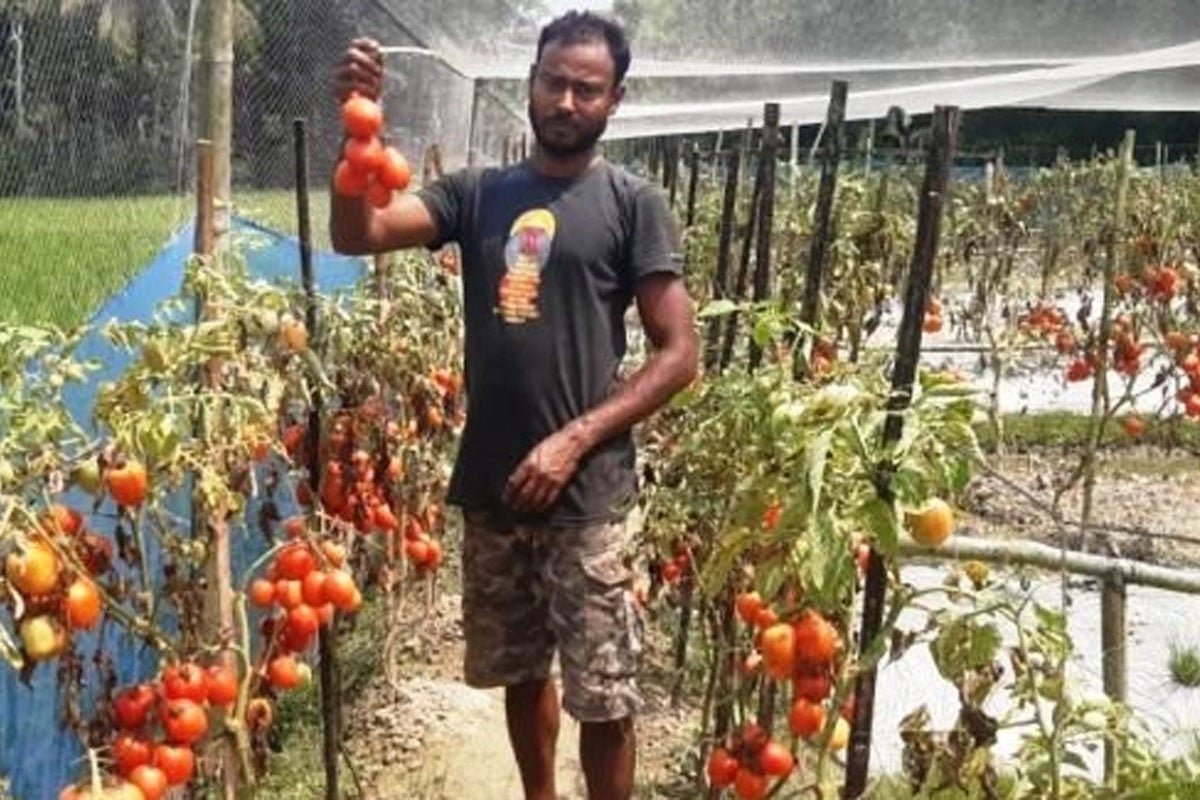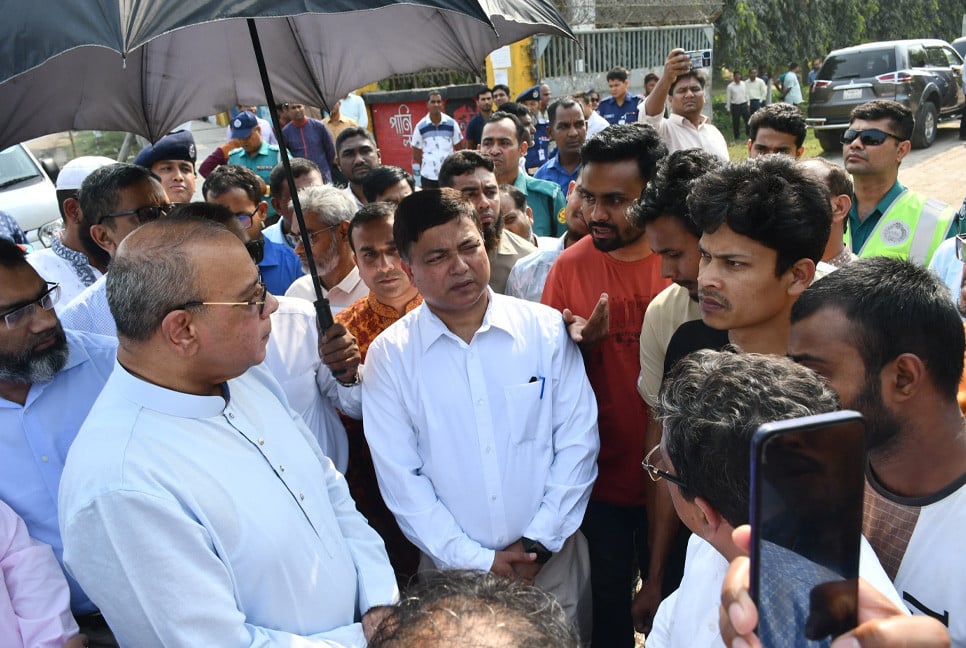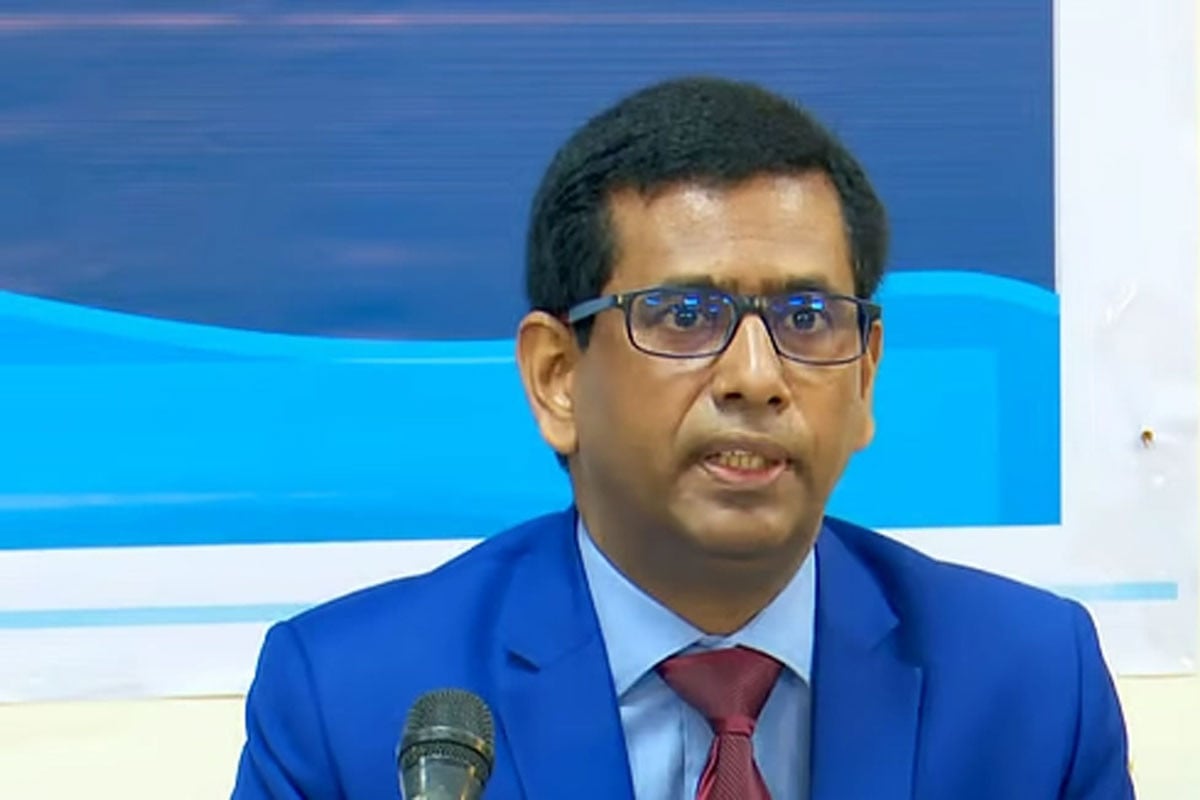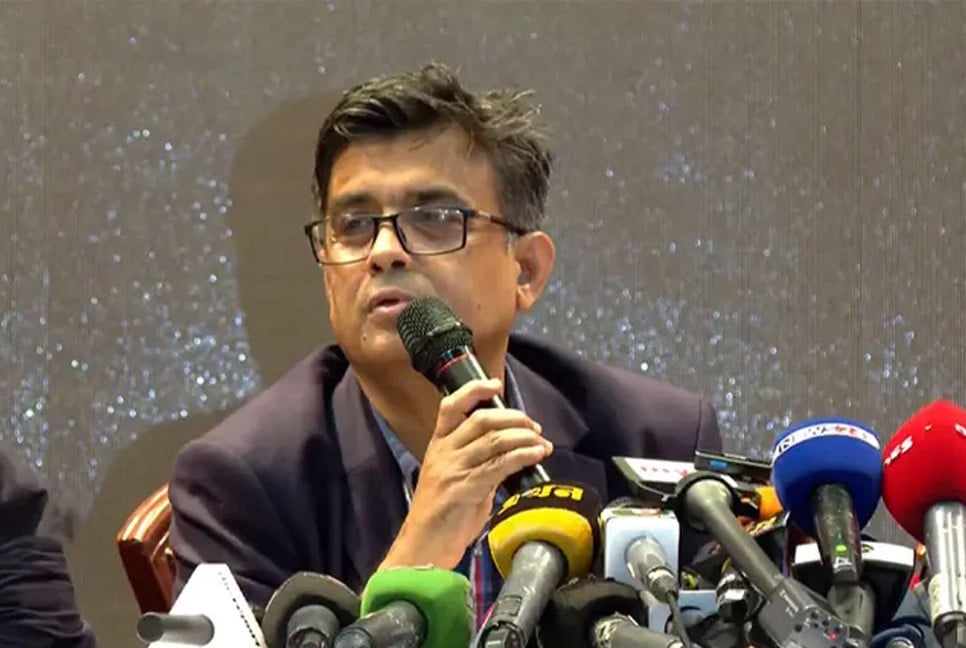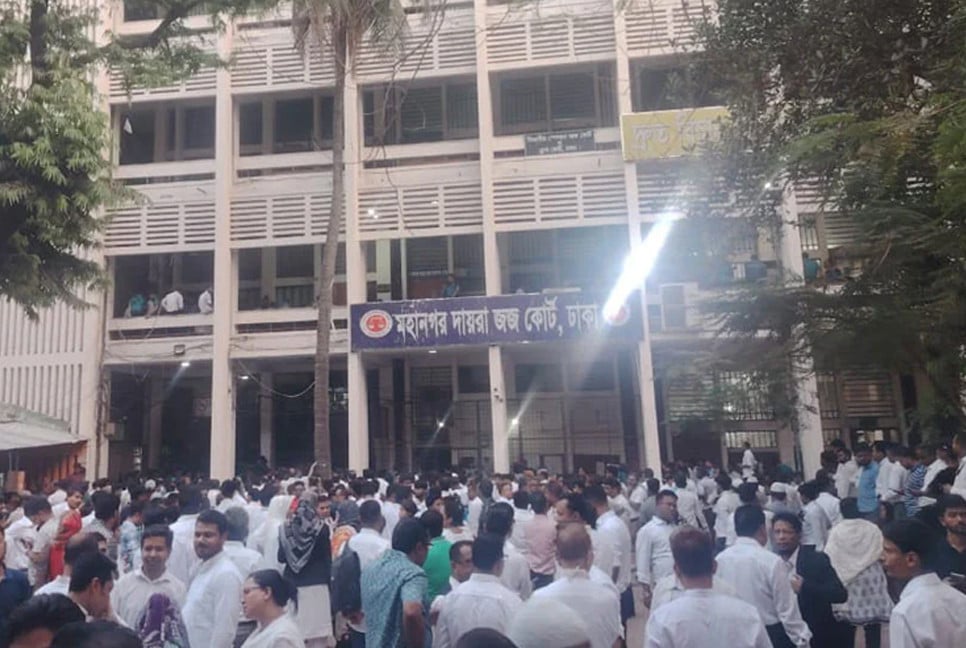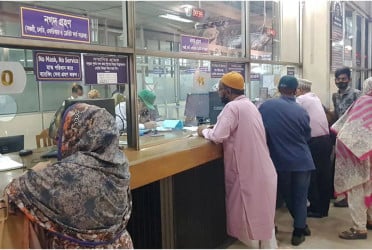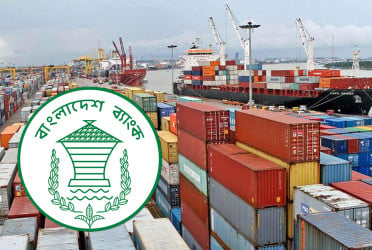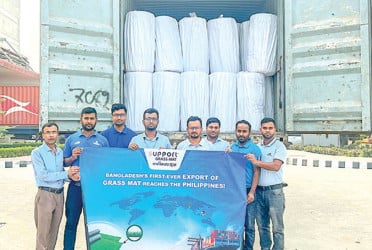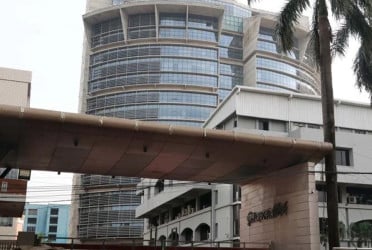A silent crisis grips Bangladesh’s agricultural heartland as tomato farmers face an unprecedented price collapse, turning a season of promise into financial despair. Once hopeful for profitable returns, cultivators now find their produce nearly worthless, with prices so low that a kilogram of tomatoes cannot even buy a cup of tea.
In Chandpur’s villages, ripe tomatoes rot in fields, abandoned by farmers who cannot afford transportation costs exceeding their selling prices. “Transport costs exceed the selling price, so what’s the point?” lamented Gias Uddin Sarkar from Nij Chengarchar, Matlab Uttar. He planted tomatoes on 40 decimals of land, hoping to replicate last year’s success, but even covering transportation expenses now seems impossible. With prices at Tk 3–5 per kg, many farmers have given up. “I don’t even go to the field anymore. Instead, I’m giving some away to relatives,” Gias said.
Veteran farmer Shah Alam Miji of Raldia village, who has spent five decades farming, shares this frustration. Cultivating 20 decimals, he harvested around 50 maunds but now transports his produce to Chandpur city markets like Biponibagh, selling deep into the night in an attempt to break even. Dulal Hossain of Mokimabad, Hajiganj, faces similar struggles, now selling near Chandpur Railway Station to escape even lower rural prices.
A survey of markets—including Baburhat, Mohamaya, Moishadi, Sahatoli, and Wireless Bazar—reveals a bleak picture. Rickshaw-van vendors in Chandpur city struggle to sell at Tk 8–10 per kg, while kitchen market rates hover at Tk 15–20 per kg. Even in Faridganj’s Chandrabazar and Rampur, prices remain dismal. Farmers such as Biswajit Sutradhar, Sohel, Monir, Shafiqul Rahman, and Mostafa Patwari despair over their losses. “We cultivated tomatoes hoping for high profits, but now everything is in vain. People are feeding rotten tomatoes to cattle,” Sohel lamented.
Faridganj Agriculture Officer Kishore Kallol noted that tomato cultivation expanded significantly this year—160 hectares compared to 67 last year. The District Agriculture Extension Department reported 657 hectares dedicated to tomatoes, with a target yield of 14,454 metric tonnes. However, an astonishing 15,768 metric tonnes have already been harvested, with 80–90% collected. Agriculturist Mohammad Mobarak Hossain attributes the surplus to improved soil fertility after last year’s floods, favourable weather, and the absence of pests. “There is no shortage of tomatoes or other vegetables, which is why prices are so low,” he said, adding that the Agriculture Department has no control over market prices.
The crisis underscores the urgent need for storage solutions. With tomatoes highly perishable and long-term storage lacking, Mobarak urged government experts to explore preservation methods to prevent devastating losses. Without intervention, this season’s heartbreak may deter future tomato cultivation, altering the region’s agricultural landscape.
A bountiful tomato harvest in Sunamganj has turned into a nightmare due to oversupply, plummeting prices, and the absence of cold storage facilities. Farmers in several villages now face financial ruin, with tomatoes selling for as little as Tk 50 per maund and buyers scarce. With no preservation options, many have abandoned their crops or fed them to cattle to minimise losses.
A recent visit to Jamalganj’s Mannanghat and Selimganj areas revealed vast fields of unharvested tomatoes. Farmers from 15 villages, including Gajaria, Kashipur, and Sharifpur, had invested heavily in tomato cultivation but now watch their crops perish as demand collapses.
Siddiq Mia, a farmer, shared his frustration: “I invested Tk 50,000 on 33 bighas of land. Now, no one will buy my tomatoes, even at Tk 50 per maund. I’ve started uprooting them to plant cucumbers and ridge gourds instead.” Abdul Alim, who spent Tk 100,000 on 60 bighas, echoed this distress: “Transporting the produce costs more than the selling price. I have no choice but to feed tomatoes to my cattle.”
Abdul Awal from Songbadpur, who relies entirely on tomato farming, planted on 30 bighas, hoping for profit. However, poor road connectivity has kept wholesalers away, leaving his ripe tomatoes to rot. “If cold storage isn’t established, farmers will abandon vegetable farming,” he warned.
The crisis highlights the urgent need for proper storage and transportation facilities. Mohammad Iqbal Azad, a training officer at the Department of Agricultural Extension (DAE) in Sunamganj, acknowledged the district’s vulnerability to natural disasters and unreliable electricity, making cold storage a challenge. “A proposal has been submitted to establish a cold storage facility. If approved, it will help reduce wastage,” he said.
Bimal Chandra Shome, additional director of the DAE for Sylhet, noted that Sunamganj produced 319,260 tonnes of winter vegetables across 12,800 hectares. He stressed the need for long-term solutions to prevent such crises. “Better market access, improved infrastructure, and preservation facilities are essential to safeguard farmers,” he said.
For struggling Sunamganj farmers, this crisis threatens their very livelihood. With no immediate relief, many reconsider vegetable farming’s viability. Without intervention, Sunamganj’s agricultural sector may decline, as farmers shift to more stable crops. The fields stand as a stark reminder of a recurring problem that demands urgent action before another season’s harvest meets the same fate.
In an encouraging turn, tomatoes from Bagerhat have been exported to Malaysia for the first time, offering relief amid plummeting prices and oversaturated domestic markets. So far, 40 metric tonnes have been shipped, with another 26 metric tonnes set to follow.
As the winter season ends, tomato farmers in Bagerhat faced difficulties selling due to oversupply. Many stopped harvesting, leaving ripe tomatoes to rot as prices collapsed. However, the new export initiative has rekindled hope, ensuring fair prices and sustaining livelihoods.
“This is a major breakthrough,” said Faisal Ahmed, a young entrepreneur spearheading the drive. “We plan to expand and export other vegetables soon.” High-quality tomato varieties—Bahubali, Beautiful-2, Bipul Plus, PM-1220, and Mintu Super—are being sent abroad for their superior taste and texture.
A visit to key production areas such as Bagerhat Sadar, Chitalmari, Mollahat, and Fakirhat revealed fields brimming with ripe tomatoes. Despite the abundance, farmers had been abandoning parts of their crops due to rock-bottom prices. Madhab Mondal from Shyampur village in Chitalmari cultivated tomatoes on three bighas but struggled to sell them at viable rates. “Ripe tomatoes are rotting in the fields. I am facing huge losses,” he said.
Shailen Nath from Charbaniari village initially sold tomatoes at Tk 50–60 per kg, but prices plummeted to Tk 3–4 per kg. “At this rate, I can’t even cover labour costs,” he said. Many farmers began losing interest in tomato cultivation.
The export initiative, however, is proving to be a game-changer. Helal Uddin Molla from Garfa village initially struggled with prices at Tk 5–6 per kg. Now, through the export project, he sells at Tk 12 per kg. “This is the first time our tomatoes are going abroad. Many farmers are hopeful again,” he said.
The effort, led by Faisal Ahmed of Madhumati Agro & Nursery, ensures farmers receive fair prices. Working with domestic buyers, his team collects tomatoes from farmers in Mollahat, Chitalmari, and Fakirhat, then ships them to Malaysia via Chattogram port in refrigerated containers.
Since January 25, 40 metric tonnes of tomatoes have been exported, with another 26 metric tonnes set to follow. Looking ahead, Ahmed aims to expand exports to include other vegetables, offering farmers a more sustainable future.
With input from agency
Bd-pratidin English/ Jisan

